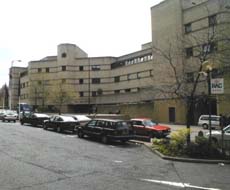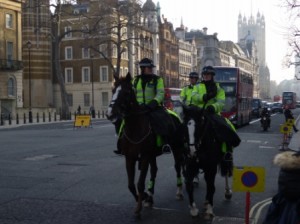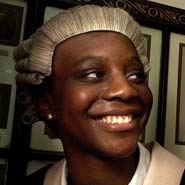Law Weblog
Funding legal services – election promises
Wednesday 28 April 2010 at 4:59 am | In News | Post Comment The £2.1bn annual legal aid budget is to be reviewed under manifesto commitments made by both Labour and the Tories. The Bar Council says changes already announced could lead to senior advocates abandoning legal aid work, as the gross hourly rate for a defence barrister with 10 years’ experience acting for a client in a robbery case is due to fall from about £50 an hour to about £30.
The £2.1bn annual legal aid budget is to be reviewed under manifesto commitments made by both Labour and the Tories. The Bar Council says changes already announced could lead to senior advocates abandoning legal aid work, as the gross hourly rate for a defence barrister with 10 years’ experience acting for a client in a robbery case is due to fall from about £50 an hour to about £30.
Not only the rate of pay for lawyers but also the court facilities themselves are under funding pressures. None of the three main parties is committed to addressing concerns about the effect on communities of closures of magistrates’ courts.
Labour’s manifesto promises greater savings in the legal aid and court systems to “help protect frontline services”.
The Conservatives and Liberal Democrats attack Labour’s record on closing courts, but both stop short of pledging to reopen any of them.
Judge alone trial causing concern
Sunday 25 April 2010 at 5:49 am | In News | Post Comment The conviction this month of four men without a jury has continued to cause concern. Media organisations, including The Times, are to challenge a “public interest immunity” provision under which evidence is kept secret even though the trial has ended.Four men were found guilty by a single judge of a £1.75 million armed robbery at Heathrow in 2004, they had hoped to have stolen £10million. Two previous trials juries failed to reach verdicts a third was stopped because of jury tampering.
The trial at the Old Bailey was the first to use controversial provisions of the Criminal Justice Act 2003 that allow for trial by a judge sitting alone when there is a danger of jury tampering.
It is expected that other cases will follow the first trial without a jury in 400 years. Parallel measures for judge-alone trials in fraud cases are on the statute book but not in force.
Shami Chakrabarti, director of Liberty said: “Jury trial has been an age-old method of boosting confidence and legitimacy in the criminal justice system. Without it, the professional classes appear to sit in permanent judgment over ordinary people.”
The men were convicted for tying up and holding at gunpoint 16 terrified employees and subjecting them to a frightening and violent attack.
The decision to allow a trial without a jury in the Heathrow case was taken by the Court of Appeal in June 2009. It followed an investigation by the Metropolitan Police’s Flying Squad, which found that “approaches” had been made to two members of the jury in the third trial arising from the robbery. Because of sensitivity and risks, defence teams have never been allowed to know what the jury tampering evidence is.
Paul Mendelle, QC, chairman of the Criminal Bar Association, said that trial by jury was a fundamental constitutional right dating back 800 years, he believes that cost is the reason for the removal of the right. It has been estimated that providing protection for the jury would cost in the region of £6 million and need more than 82 police officers, but a trial with only a judge would cost £1.6 million and require only 32 officers.
The latest trial lasted less than three months or roughly half the time it would have taken with a jury. The judge Mr Justice Treacy sitting alone, deliberated for 12 days.
The judge sentenced the four men to, life, 20 years, 17 years and 15 years.
Crown Court to work shifts
Friday 16 April 2010 at 11:43 am | In News | Post Comment As from June 2010, the Crown Court sitting in Croydon is to test the concept of double shift court sittings for a period of six months up to the end of the calendar year.The project will operate in two of the ten courts, Courts 3 and 5. There will be two separate shifts in each of the two courtrooms – meaning two trials running concurrently on any given day.
The first shift will commence at 9am and go through to 1.30pm. The second shift will commence at 2pm and go through to 6.30pm. There will be a break in the middle of each shift.
Sentencing Council criticised before it starts
Wednesday 14 April 2010 at 12:13 pm | In News | Post Comment Recent changes have transferred the making of sentencing guidelines from the Sentencing Advisory Panel to the Sentencing Council. The change was criticised in 2009 by circuit judges but has still gone ahead.Professor Andrew Ashworth, the Vinerian professor of English law at the University of Oxford is critical of the new legislation that accompanies the change.
The legislation states that judges must, “follow any sentencing guidelines which are relevant to the offender’s case … unless the court is satisfied that it would be contrary to the interests of justice to do so”. Previously judges were compelled to merely “have regard to” relevant guidelines and to give reasons for any departure from them.
The new act allows judges the freedom to give offenders a sentence anywhere between the bottom of the lowest category – of five categories – and the top of the highest category, without explaining their rationale.
Criminal Evidence (Witness) Act 2008
Wednesday 14 April 2010 at 11:49 am | In News | Post Comment The Criminal Evidence (Witness) Act 2008 survived its first test when two amateur assassins were jailed for life for murder, last month. They gunned down a successful wheel clamping firm owner, Charles Butler outside his home.The case hit complications following a ruling by the Law Lords which restricted anonymous witnesses. A CCTV system the victim had installed recorded the shooting.
Mr Butler’s wife and stepdaughter offered the men £5,000 to have him killed, claiming he had sexually abused the stepdaughter
Mr Butler remained alive in hospital for nine months before succumbing to his injuries.
Four witnesses had already given evidence from behind screens with their voices distorted, and the ensuing chaos caused the judge to stop the trial.
The legislation rushed through by Justice Secretary Jack Straw reintroduced witness anonymity which enabled a second trial to go ahead, but a deadlocked jury could only agree on convicting Johnson for perverting the course of justice.
Police – evidential material – ASBOs and lots more
Wednesday 14 April 2010 at 9:07 am | In News | Post Comment The Crime and Security Act 2010 became law last week and made various changes to police procedure and related matters.• police powers of stop and search – reduces information required for police stops and searches. Where the record of search is to include person’s name and description of person or vehicle, it removes the requirement for the officer to record the incident himself (presumably to allow to be recorded online or over the radio);
• taking, retention, destruction and use of evidential material – establishes new time limits for the retention of DNA samples, DNA profiles and fingerprints (following a European Court of Human Rights judgement) together with extensions to the circumstances in which such samples can be collected;
• the protection of victims of domestic violence – introduces a new Domestic Violence Protection Notice, by which a senior police officer could require a suspected perpetrator to stop molesting a victim and to leave the premises, pending application to court for the Bill’s new Domestic Violence Protection Order;
• anti-social behaviour orders – strengthens the legal assumption that a court will make a parenting order when 10-15 year olds are convicted for a breach of an anti-social behaviour order;
• private security industry – establishes a new licensing requirement for businesses carrying out vehicle immobilisation, in addition to the existing one for individuals;
• possession of mobile telephones in prison – introduces a new criminal offence of possessing a mobile telephone in prison;
• air weapons – introduces a new offence of allowing minors access to air weapons.
Secondaries parties revisited
Sunday 4 April 2010 at 7:33 pm | In News | Post CommentR v Mendez and Thompson [2010] CA
DD were part of a group who chased their victim in the street following a fight at a house about stolen Xboxes. The prosecution alleged that Thompson was the stabber. The jury convicted Thompson and Mendez on the basis that they were secondary parties.
One ground for Mendez’s appeal was whether the use of the knife was “fundamentally different” from anything he foresaw. Thompson appealed on similar grounds.
Held: The court reviewed all the existing cases on joint enterprise and allowed their appeals.
D is not liable for the murder of V if the direct cause of V’s death was a deliberate act by P, which was of a kind (a) unforeseen by D and (b) likely to be altogether more life threatening than acts of the kind intended or foreseen by D.
“It would not be just that D should be found guilty of murder of V by P, if P’s act was of a different kind from, and much more dangerous than, the sort of acts which D intended or foresaw as part of the joint enterprise.”
The principle established in Chan Wing-Siu [1985] HL and reaffirmed in Powell and English [1999] HL is that a secondary party is criminally liable for acts by the primary offender of a type, which the former foresees as a possibility but does not intend. Lord Rodger illustrated the principle in Rahman [2008] HL:
“Suppose that, knowing what A is like and that he tends to carry a gun, B contemplates that A may take a gun and use it in the course of the attack on the victim. Then, even if B is vehemently opposed to the use of a gun and tries to dissuade A from carrying one, nevertheless, if, being aware of the risk, B takes part in the joint assault, he will be guilty of murder if A shoots the victim.
Lord Mustill in Powell and English stated that where D and P embark on a criminal venture in which P goes further than D wishes, but foreseeably so, D has a measure of culpability for P’s act and V’s resulting death but usually at a lower level than P, D is guilty of murder.
In the instant case it was submitted that the unforeseen use of a knife was plainly so different from anything foreseen by Mendez that no jury could have found him guilty of murder on a proper direction.
Not guilty of murder, guilty of violent disorder
Commentary: This case has been reported as showing confusion of the law, but it appears that the law was simply misapplied in this case.
Whole case here
Expansion of barristers’ role
Sunday 4 April 2010 at 2:54 pm | In News | Post Comment Barristers are now able to become managers in legal disciplinary practices regulated by the Solicitors Regulation Authority and work in partnerships with other barristers. The Legal Services Board has relaxed the bar rules that will allow barristers to take advantage of the Legal Services Act 2007.They will now be able to work part-time in an employed or managerial capacity and part-time as a self-employed barrister in chambers. They will also be able to share premises and office facilities with other professionals.
Perhaps the most noiticable change will be that barristers can now carry out work on the preparation of cases that previously only solicitors could do. They will now be able to investigate and collect evidence and witness statements, attend police stations and conduct correspondence.
The public access scheme, which allows people to instruct barristers directly without the need to approach a solicitor fist, will be expanded.
There is no indication how many established practitioners will embrace the changes.
BSB announcement here
Powered by WordPress with Pool theme design by Borja Fernandez.
Entries and comments feeds.
Valid XHTML and CSS. ^Top^





